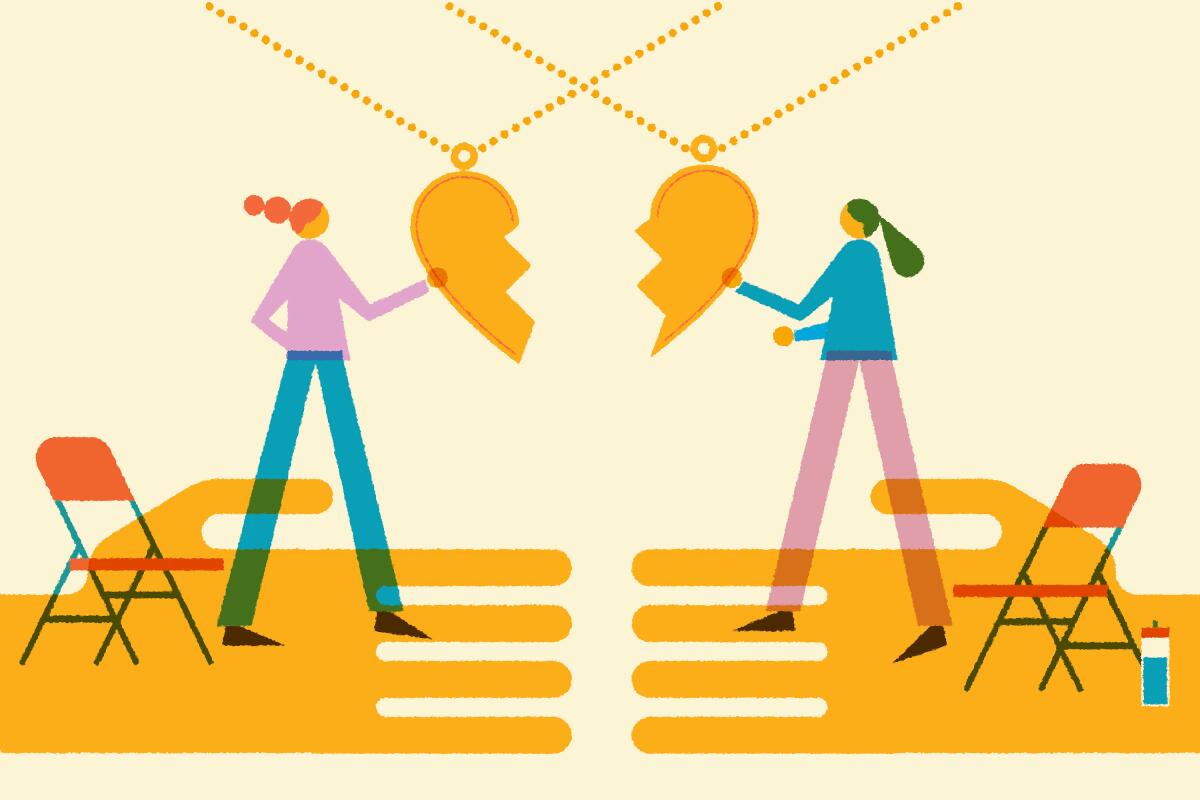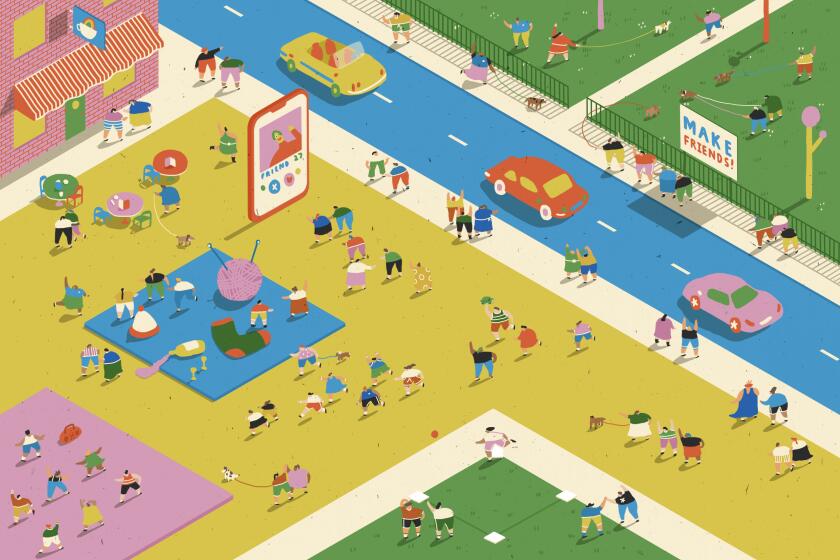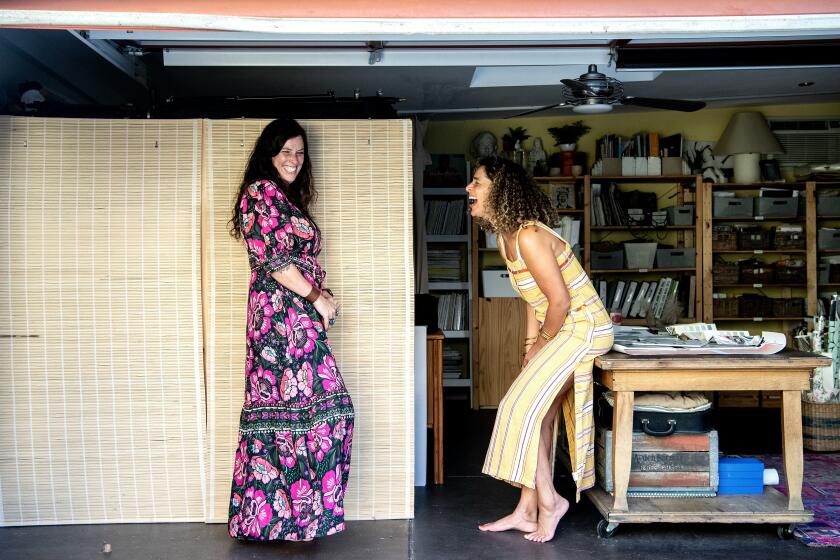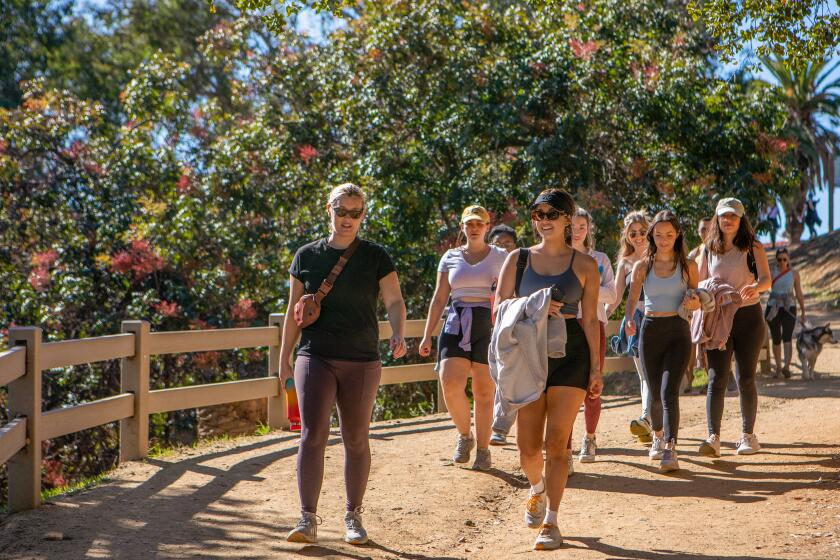Dating coaches are everywhere. Next up: Friendship coaches

- Share via
Over the last decade, there has been a major proliferation of coaches — the nonathletic kind.
The life coaches of the 1980s have since spawned career coaches, weight loss coaches, dating coaches, party coaches and friendship coaches. Friendship has risen from the secret diary entries of teenage girls and entered the public zeitgeist. From friendship breakups to prioritizing friendships over romantic relationships to choosing to live near friends to buying a house with friends, friendship coaches have a lot to chime in on.
Studies show that friendships help people live longer, healthier, more fulfilling lives, yet some of us are finding it harder to make, keep and let go of friends. Blame it on the loneliness epidemic, the not-so-long-ago COVID-19 pandemic closures, being Extremely Online or just the ebbs and flows of getting older.
Friendship coaches are providing guidance that includes breaking up with a friend and unexpected tools to identify which friendships belong in one’s inner circle.
Unlike dating coaches, who often take a more hands-on approach by creating and editing dating profiles, curating photos and drafting text messages, most friendship coaches act as educators either in group settings or in one-on-one sessions.
“It was very eye opening for me. I did a lot of soul searching and figuring out what I was looking for in friendships,” Diane Van Dyke, a 68-year-old retired elementary school teacher from Boca Raton, Fla., said of her friendship coaching experiences. During the pandemic, when she was still working, she found it difficult to make friends in her competitive and stressful work environment. Van Dyke learned about friendship coaching from a book and signed up for a group coaching circle.
An exploration of friendship in Los Angeles, from guides on how to make friends and set boundaries to touching stories of people who stepped up.
“We were put in little groups with perfect strangers and tasked with contacting the people in our group… I am actually still in touch with three people. They’ve got kids in school, I’ve got grandkids. We’re all over the map. I love it,” she said.
Van Dyke sees value in friendship coaching because people aren’t usually taught directly how to make, keep or think about friends. “It’s hard to facilitate teaching children to make friends when in a traditional classroom, lunchtime and recess are the only times children can talk openly with each other,” she said.
Van Dyke’s friendship coach was Shasta Nelson, who started off as a pastor offering marriage and divorce counseling before transitioning into friendship coaching. Some of the questions she would often ask her clients were, “ ‘Who’s supporting you as you go through this [divorce]? What are your friends saying about this?’ Most people replied with ‘nobody, and I’m only talking to you about this.’” Nelson began researching friendship in 2008 and has since written three books on the topic.
For the record:
1:06 p.m. Sept. 6, 2023An earlier version of this article incorrectly stated that Shasta Nelson has written four books on friendship. She has written three.
“There’s a cultural understanding that marriage takes work, and that there’s going to be fights, that you’re going to make up, and you’re going to keep going,” she said. “When it comes to our friendships, we hold a belief that they should just always feel good and easy, and if you can’t read my mind, then somehow, you’re not a good friend.”
Although there are credentials lifestyle coaches can earn to be verified, there is little to no oversight or requirements. For example, Nelson doesn’t have such a credential, but she has a master’s degree in divinity from Andrews University, a seventh-day Adventist institution in Michigan, where she took counseling classes. When she served as a pastor, Nelson ran programs, facilitated small groups and wrote curriculum for personal growth.
Still, the lack of regulations means there are opportunities for scammers. They set up flashy social media posts that make them seem more legitimate than they are to get a slice of the $3-billion industry. Credentialing programs like the ones offered by the 27-year-old International Coaching Federation involve 60 to 125 hours of coach-specific education and 100 to 2,500 hours of client coaching experience, depending on the level of certification.
There’s often a misperception of who uses friendship coaches, said Danielle Bayard Jackson, who started her career as a high school English teacher before transitioning to friendship coaching and public relations.
“A lot of people picture someone seeking friendship coaching as socially awkward, an introvert or a wallflower, but my roster is often filled with high achieving, charismatic, funny, clever, smart people who don’t feel connected or satisfied in their friendships,” said Bayard Jackson, whose book “Fighting for Our Friendships” is scheduled to publish next year.
When she was a teacher, she noticed how much of an affect friendship had on students’ focus and development. When she left the classroom, she thought what she initially perceived as “teen drama” was behind her. Instead, the same issues popped up in her next chapter.
Faith Blakeney, her teen daughter and Sally Montana became housemates to pay the rent in Los Angeles. Beyond saving money, they’ve built a ‘circle of women.’
“When I left the classroom and got into public relations, I made the foolish mistake [of thinking], ‘Oh, well, I am leaving that teenage drama behind because I am working with these self-assured, charismatic women,’” she said, “But I noticed they too were privately grappling with friendship issues.”
It was an aha moment for her, one that led her to seeking a life coaching course and working as a friendship coach. No matter what life stage you’re in, you may be learning something new about your friendships.
One of Bayard Jackson’s clients, Debby Bonnell, started working with her as she was cutting ties with two friends she’d had for more than 45 years. Her father had also recently died, and the 57-year-old from Phoenix needed help sorting through all these complicated emotions.
She was reading books, listening to podcasts — that’s actually how she first heard of Bayard Jackson — and talking with trusted friends, but she was still feeling unmoored. The 75-minute one-on-one coaching session with Bayard Jackson granted her the clarity she needed. “I literally felt like somebody took a 50-pound vest off my back at the end of it. Things made sense,” she said.
Although Bonnell found clarity, friendship coaching is not therapy.
“I’ve done therapy in my younger years, and in my 20s. I’m now in my late 50s. I think there’s a lot of wisdom that’s gained in that 30-year period. [Friendship coaching] is different from therapy. It’s kind of like talking to an old, wise, trusted friend, as opposed to a doctor-patient relationship,” Bonnell said.
Therapists are trained to treat mental health, self-sabotaging, behavioral and emotional concerns, often related to trauma, while coaches are for people who are functioning or high functioning and need additional help with life skills and/or emotional discomfort. Coaches are not meant to replace therapists. While therapy may sometimes be covered by insurance, coaching is not.
“I know there’s this beef between coaches and therapists. Everybody’s like, ‘Stay in your lane,’” said Bayard Jackson. “It’s not my job to facilitate a therapy session… A lot of clients start by saying, ‘Well, you know, I’ve done therapy and all that, and I’m in therapy, but I’m ready to stop processing it, and now I need to know what to do next.’”
Still, one may talk about their relationships — from the excitement of a new beginning to the disappointment of a breakup — with both a therapist and a coach.
Like Bonnell who started her coaching experience after breaking up with two friends, J’Leen Manning Saeger also sought out a coach when her friendships soured.
“I was trying to become friends with people with whom I was not a good fit, but I didn’t know that at the time,” she said. “So two different times, I was dumped, and the third time, I should have dumped.”
So the 51-year-old Spanish professor from San Antonio attended Nelson’s group coaching circle sessions in search of better friendships.
“I already know how to make friends. I’ve made friends all my life,” she said, but after her initial group session, which felt more like an educational workshop, she discovered there was more to learn.
When she moved to Los Angeles, Monica Figueroa launched L.A. Girls Who Walk for women finding it hard to make friends and find healthy ways to hang out.
The online group coaching circles begin with assessing current friendships, articulating what types of friendships they want to develop and setting a friendship goal. The rest of the program involves Nelson teaching members of the group how to start and deepen the relationships in their lives and practice the actions and skills in small breakout rooms.
Manning Saeger learned about circles of friendship in Nelson’s coaching group.
According to British anthropologist Robin Dunbar, the average person has about five or fewer loved ones in the most intimate circle, 15 good friends, 50 friends and 150 meaningful contacts. These numbers are fluid and vary from person to person.
“I was trying to put people into the most intimate circle that didn’t belong there, or who didn’t want to be there. That intimate circle really only needs three or four friends. I was putting 20 people in there, anybody who came into my life. We don’t have the time, energy or emotional bandwidth to keep up friendships like that,” Manning Saeger said.
Friendship coaching won’t work unless you’re open to trying something new. The ideal candidate wants to learn more about relationships and is willing to take accountability, said Nelson.
“What I’ve been focusing on in new friend groups is not allowing myself to feel misunderstood. I’ve been seeking clarity early on, as opposed to letting stuff fester,” Bonnell said. She recalled some advice Bayard Jackson gave her.
“At the end of friendships, it’s very easy to focus on all the negatives, but you really should try and recall the positives of the friendship that made it last so long,” she added.
More to Read
Sign up for The Wild
We’ll help you find the best places to hike, bike and run, as well as the perfect silent spots for meditation and yoga.
You may occasionally receive promotional content from the Los Angeles Times.














